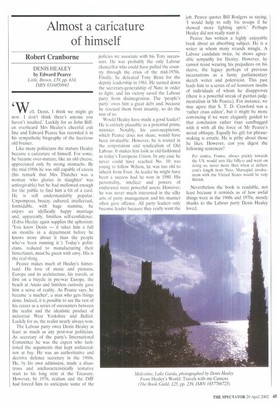Almost a caricature of himself
Robert Cranborne
DENIS HEALEY by Edward Pearce Little, Brown, £39, pp. 634, ISBN 0316858943 Well, Denis, I think we might go now. I don't think there's anyone you haven't insulted. Luckily for us John Siffen overheard Mrs Healey's cheerful exit line and Edward Pearce has recorded it in his sympathetic biography of the facetious old bruiser.
Like many politicians the mature Healey became a caricature of himself. For some, he became over-mature, like an old cheese, appreciated only by strong stomachs. By the mid-1980s he was still capable of excess (his remark that Mrs Thatcher was a woman who glories in slaughter' was unforgivable) but he had mellowed enough for the public to find him a bit of a card. He is still understandably popular. Unpompous, breezy, cultured, intellectual, formidable, with huge stamina, he enjoys an idyllically happy marriage and, apparently, limitless self-confidence. (Edna Healey again supplies the aphorism: 'You know Denis — it takes him a full six months in a department before he knows more about it than the people who've been running it.') Today's politicians, reduced to manufacturing their hinterlands, must be green with envy. His is the real thing.
Pearce makes much of Healey's hinterland. His love of music and pictures, Europe and its architecture, his travels, at first on a bicycle in pre-war Europe, the beach at Anzio and limitless curiosity gave him a sense of reality. As Pearce says, he became 'a macher', a man who gets things done. Indeed, it is possible to see the rest of his career as a series of encounters between the realist and the idealistic product of industrial West Yorkshire and Balliol. Luckily for us, the realist nearly always won.
The Labour party owes Denis Healey at least as much as any post-war politician. As secretary of the party's International Committee he was the expert who fashioned the arguments that kept unilateralism at bay. He was an authoritative and decisive defence secretary in the 1960s. He, by his own admission, made a disastrous and uncharacteristically tentative start to his long stint at the Treasury. However, by 1976, realism and the IMF had forced him to anticipate some of the policies we associate with his Tory successors. He was probably the only Labour chancellor who could have pulled the country through the crisis of the mid-1970s. Finally, he defeated Tony Benn for the deputy leadership in 1981. He turned down the secretary-generalship of Nato in order to fight, and his victory saved the Labour party from disintegration. The 'people's party' owes him a great debt and, because he rescued them from insanity, so do the rest of us.
Would Healey have made a good leader? He is entirely plausible as a potential prime minister. Notably, his euro-scepticism, which Pearce does not share, would have been invaluable. However, he is rooted in the corporatism and syndicalism of Old Labour. It makes him look as old-fashioned as today's European Union. In any case he never could have reached No. 10: too young to follow Wilson, he was too old to inherit from Foot. As leader he might have been a success had he won in 1980. His personality, intellect and powers of endurance were powerful assets. However, he was never much interested in the silky arts of party management and his manner often gave offence. All party leaders only become leader because they really want the
job. Pearce quotes Bill Rodgers as saying, would help to rally his troops if he showed more fighting spirit.' Perhaps Healey did not really want it.
Pearce has written a highly enjoyable book about an absorbing subject. He is a writer in whom many strands mingle. A Labour candidate twice, he shows agreeable sympathy for Healey. However, he cannot resist wearing his prejudices on his sleeve, the legacy perhaps of previous incarnations as a funny parliamentary sketch writer and polemicist. This past leads him to a series of ad hominem insults of individuals of whom he disapproves (there is a powerful streak of puritan judgmentalism in Mr Pearce). For instance, we may agree that S. T. D. Crawford was a 'rather crass editor', but it might be more convincing if we were elegantly guided to that conclusion rather than sandbagged with it with all the force of Mr Pearce's moral obloquy. Equally his gift for phrasemaking is erratic. He is pithy about those he likes. However, can you digest the following sentences?
Per contra, France, always prickly towards the US, would arm like billy-o and went on doing so, never more than when at defiant arm's length from Nato. Marsupial involvement with the United States would be very British.
Nevertheless the book is readable, not least because it reminds us of how awful things were in the 1960s and 1970s, mostly thanks to the Labour party Denis Healey loved,






































































 Previous page
Previous page